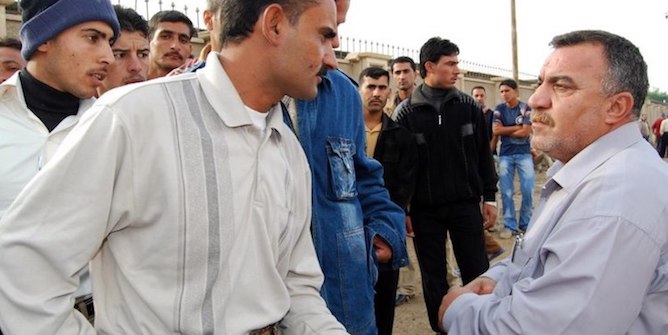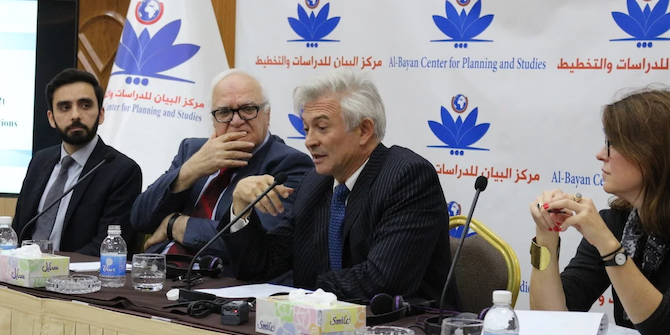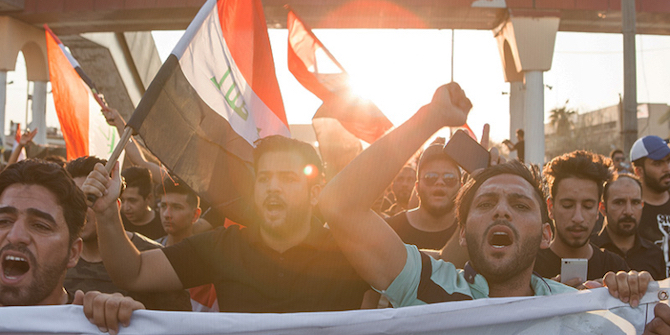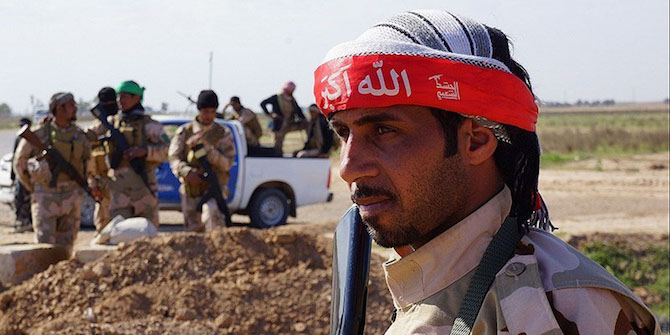by Christine van den Toorn

Iraq’s disputed territories remain among the most intractable and incendiary issues facing the country. Since 2003, the rival powers of the Federal Government of Iraq (GOI) and the Kurdistan Regional Government (KRG) have failed to find a mutually acceptable formula for long-term administration of the territories. Instead, each has sought to impose its power through a combination of coercion, corruption and patronage in an attempt to create facts on the ground. Moreover, both sides have adopted a zero-sum mentality that equates compromise with political defeat. This environment has exacerbated local disputes, and created economic, social and political fissures that have been enthusiastically exploited by extremist groups.
While past proposals – from UNAMI in 2009 and from various government actors during formation of the executives in 2010 and 2014 – have fallen afoul of this corrosive mindset, current conditions may provide a new opportunity to find a lasting resolution to the status of the territories. The IS offensive in Iraq and the costly campaign to unseat it underlined the risks that ongoing territorial dispute posed. Perhaps more importantly, the reinstitution of federal government control in large swathes of the territories in October 2017 challenged KRG expansion into the areas that had begun in 2003. But the lesson of the past fifteen years for Baghdad and Erbil is that such reliance on force and muddling through creates more risks than rewards. A long-term resolution, requiring compromise on both sides, is required; and the process of forming a new government in Iraq may provide an opportunity to begin a new dialogue.
This project will examine four factors that will be key to any design for a resolution formula: public authority; the political marketplace; public mutuality; and civicness. These elements have been at the core of the dispute so far and will continue to fuel it unless addressed seriously.
Public Authority
To date, one of the key drivers of conflict has been competing administrations within the disputed territories. A febrile competition between the federal government and the KRG exists in multiple areas, including security, public services, employment and even education. In one of the more egregious examples, the children of KRG public sector employees cannot send their children to federal government schools. Control in each of these areas is used as a political weapon to cow local populations, either through the provision of resources and services or withholding them. When Khanaqin asks for oil, for example, Erbil points them to Baquba, who says they should talk to Erbil. This process has ripped communities apart, pitting them against each other and forcing them to take sides in the national dispute.
From 2003 to 2017, in spite of de jure federal authority, the Kurdish presence in the disputed territories in the form of a local population, party offices, schools and clinics, and security forces, led Kurds to assume de facto authority in many areas. However, today, following the Kurdish referendum on independence and the events of 16–17 October 2017, the GOI has nearly exclusive control of the disputed territories for the first time in over a decade.
But in most of the disputed territories, local sentiment does not align with this dichotomy. Residents increasingly care less about the identity of the administration they live under, and more about what – services, security – these governments provide. Ultimately, these populations are looking for local autonomy and local solutions that serve their interests. This shared vision for governance in their territories, and bottom-up approach may provide more fertile ground for reaching a lasting formula than the national ones that have been tried so far.
Political Marketplace
Battles over economic resources are feeding the dispute over territory. Control over public-sector jobs, land, smuggling routes and natural resources are all up for grabs; moreover, they are used by competing parties to secure their power and control. The use of patronage is particularly intense as rivals seek to win the hearts and votes of local populations through government jobs, hand-outs from parties and gifts of land and houses. Baghdad and Erbil may be reluctant to invest in vitally needed infrastructure in disputed territories, but they have not hesitated to line the pockets of local notables with money for votes and loyalty.
Patronage and corruption will never disappear entirely. However, improving institutional capability and enhancing rule of law will be critical to reversing the current situation. Formulae designed to improve the equitability of services and opportunities, and to guarantee local security will be needed if the destructive impact of the present system is to be reversed.
Public Mutuality
The conflict over the territories has been inflamed and deepened by competing nationalisms and the use of identity politics to rally local sentiment and justify territorial claims. Kurds claim that disputed territories are Kurdish or Kurdistani, whereas other Iraqi groups claim them as Iraqi or Arab or Turkmen. Iraqi Shia Turkmen in Tuz Khormatu, for example, have been empowered by the rise of their sect’s power in Baghdad since 2003, adding fuel to the flames of tensions in that town, over which Kurdish claims run deep.
However, a combination of political, security, economic and demographic drivers appear to be reducing the appeal of ethno-sectarian nationalism across Iraq, including in Kurdistan. The political structure that has prevailed since 2003 is increasingly seen as a failure, and many Iraqis have decided that jobs, peace, salary, and education are more important than ethno-sectarian slogans. Iraqi leaders are being forced to adapt to this new reality, or face rising protest against their rule. This pressure could conceivably moderate the identity-based claims to the disputed territories, creating avenues for practical solutions.
Civicness
The obdurate approach of both the federal government and the KRG has limited the scope for bottom-up solutions over the past fifteen years. The diverse communities of the disputed areas – Kurd, Arab, Turkmen, Christian, Yezidi and Shabak – have long histories and relationships, as well as economic partnerships. But in almost every disputed area, from Khanaqin to Kirkuk to Sinjar, the consistent local complaint is that local formulae are blocked by national politics. Any deals they attempted to make were spoiled by national actors, preferring them to remain on either side.
The strength of these local social relations may provide a hitherto untested mechanism for long-term settlement. Bottom-up solutions remain possible in most areas as the best (if only the first) step toward a solution. Events over recent years, starting with the ISIS attack, have left an indelible mark; in some towns like Tuz Khormatu tensions have sadly become embedded in social relations. But local deal-making and civility remain the strongest opportunity for settlement, though they must be reinforced by national-level deals. Moreover, due to shifts in public authority, public mutuality, and the political marketplace, there is potential for them in the current environment.
They key question remains whether the federal government and the KRG will embrace local settlements and provide the space – and support – for them to take hold, or whether they will remain wedded to their winner-takes-all approach. Presenting new formulae will mean little if this mindset does not change. An opportunity appears to exist at present. It is up to Iraqi leaders to seize it.
*This blogpost introduces the LSE research project Public Authority and Iraq’s Disputed Territories by Christine van den Toorn, examining the territorial dispute between the Government of Iraq and the Kurdistan Regional Government. This project forms part of the Conflict Research Programme, funded by the UK Department for International Development to provide research and policy advice on how the risk and impact of violent conflict might be more effectively reduced through development and governance interventions.






